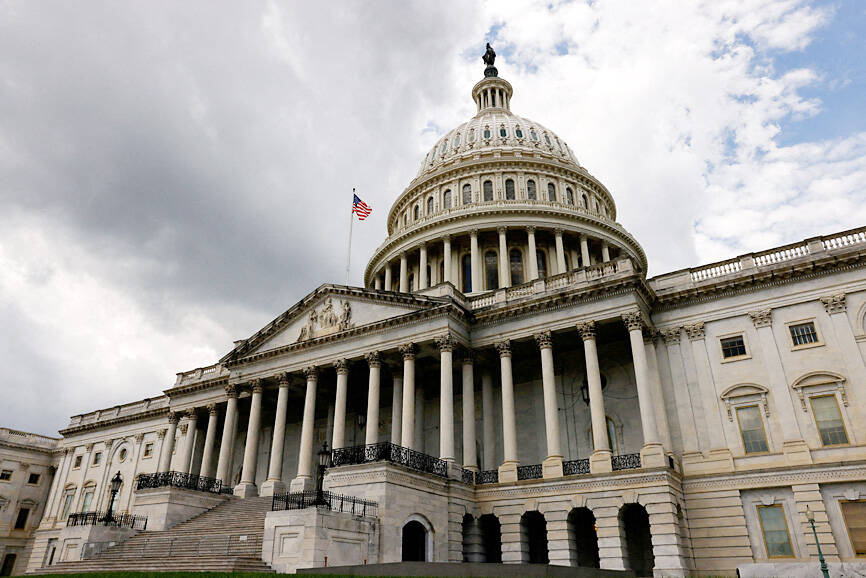The US Congress on Wednesday voiced bipartisan support for legislation to avoid double taxation between Taiwan and the US.
US senators Ben Cardin and Jim Risch, chair and ranking member of the Senate Foreign Relations Committee respectively, along with Ron Wyden and Mike Crapo, chair and ranking member of the Senate Finance Committee respectively, endorsed a package of legislation to provide double-tax relief between the two nations ahead of its scheduled markup in the US House of Representatives’ Ways and Means Committee yesterday, the foreign relations and finance committees said.
The legislation released by the Ways and Means Committee incorporates the US-Taiwan Expedited Double-Tax Relief Act and the US-Taiwan Tax Agreement Authorization Act, they said.

Photo: Reuters
The US-Taiwan Expedited Double-Tax Relief Act passed unanimously out of the Senate Finance Committee in September and was formally introduced in the Senate and the House last month.
The Taiwan Tax Agreement Act passed out of the US Senate Foreign Relations Committee by voice vote in July, authorizing US President Joe Biden’s administration to negotiate and conclude a tax agreement between the two sides.
The four leaders of the Senate committees on Wednesday said in a statement that “providing double-tax relief is “a long overdue step” to bolster the important relationship with Taiwan, which is “one of the world’s largest economies” and one of the US’ top trading partners.
The bills would address the problem of double taxation, facilitate broader investment between the two sides, create more jobs across the US and “help promote our collective prosperity, national security and economic resilience,” they said.
The legislation provides expedited double-tax relief through amending the US tax code, which “paves the way for future agreements” between Taiwan and the US on additional and more comprehensive double-tax relief, they said.
The leaders “fully endorse this legislative effort” and applaud the Ways and Means Committee for its planned markup of the bills, they said.
“We look forward to the swift passage of this legislative package and enactment into law as a critical step forward in our continued partnership with Taiwan,” they added.
In Taipei, the Ministry of Foreign Affairs yesterday welcomed the bills, saying that the government would continue to work closely with the US government and US Congress to foster complementary and mutually beneficial economic, trade and investment relations between Taiwan and the US.

Seventy percent of middle and elementary schools now conduct English classes entirely in English, the Ministry of Education said, as it encourages schools nationwide to adopt this practice Minister of Education (MOE) Cheng Ying-yao (鄭英耀) is scheduled to present a report on the government’s bilingual education policy to the Legislative Yuan’s Education and Culture Committee today. The report would outline strategies aimed at expanding access to education, reducing regional disparities and improving talent cultivation. Implementation of bilingual education policies has varied across local governments, occasionally drawing public criticism. For example, some schools have required teachers of non-English subjects to pass English proficiency

‘FORM OF PROTEST’: The German Institute Taipei said it was ‘shocked’ to see Nazi symbolism used in connection with political aims as it condemned the incident Sung Chien-liang (宋建樑), who led efforts to recall Democratic Progressive Party (DPP) Legislator Lee Kun-cheng (李坤城), was released on bail of NT$80,000 yesterday amid an outcry over a Nazi armband he wore to questioning the night before. Sung arrived at the New Taipei City District Prosecutors’ Office for questioning in a recall petition forgery case on Tuesday night wearing a red armband bearing a swastika, carrying a copy of Adolf Hitler’s Mein Kampf and giving a Nazi salute. Sung left the building at 1:15am without the armband and apparently covering the book with a coat. This is a serious international scandal and Chinese

TRADE: The premier pledged safeguards on ‘Made in Taiwan’ labeling, anti-dumping measures and stricter export controls to strengthen its position in trade talks Products labeled “made in Taiwan” must be genuinely made in Taiwan, Premier Cho Jung-tai (卓榮泰) said yesterday, vowing to enforce strict safeguards against “origin laundering” and initiate anti-dumping investigations to prevent China dumping its products in Taiwan. Cho made the remarks in a discussion session with representatives from industries in Kaohsiung. In response to the US government’s recent announcement of “reciprocal” tariffs on its trading partners, President William Lai (賴清德) and Cho last week began a series of consultations with industry leaders nationwide to gather feedback and address concerns. Taiwanese and US officials held a videoconference on Friday evening to discuss the

PERSONAL DATA: The implicated KMT members allegedly compiled their petitions by copying names from party lists without the consent of the people concerned Judicial authorities searched six locations yesterday and questioned six people, including one elderly Chinese Nationalist Party (KMT) member and five KMT Youth League associates, about alleged signature forgery and fraud relating to their recall efforts against two Democratic Progressive Party (DPP) legislators. After launching a probe into alleged signature forgery and related fraud in the KMT’s recall effort, prosecutors received a number of complaints, including about one petition that had 1,748 signatures of voters whose family members said they had already passed away, and also voters who said they did not approve the use of their name, Taipei Deputy Chief Prosecutor